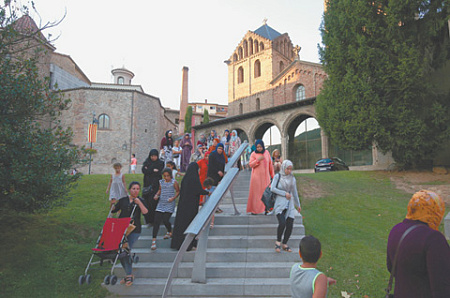
A local government in southeastern Spain has ignited a national firestorm by prohibiting the public celebration of two major Muslim holidays, Eid al-Fitr and Eid al-Adha. The municipal council of Jumilla, a town in the Murcia region, justified the ban by claiming the festivities are “alien to Spanish identity,” a move that has drawn sharp criticism from the national government and accusations of leveraging xenophobia for political gain. While the ban is expected to be legally overturned, it has set a contentious precedent for religious freedom debates across the European Union.
The decision specifically targets the Muslim community’s use of public facilities, such as administrative buildings and sports halls, which for years have served as gathering places for holiday prayers. In Jumilla, a town of approximately 27,000 residents, the ban directly affects a community of about 1,500 practicing Muslims and a larger population of over 3,000 people originating from Muslim-majority countries. The council’s resolution states that public venues cannot be used for religious or cultural events “alien to our identity” unless organized by the local authorities themselves, effectively outlawing the observances.
The ban was spearheaded by the conservative People’s Party (PP), which holds a majority with 10 of the 21 seats on the town council. The motion, however, was reportedly authored and strongly supported by the representative from the far-right, anti-immigrant Vox party. Following the vote, Vox celebrated on social media, declaring, “Thanks to Vox, the first decision in Spain to ban Islamic holidays in public places has been approved. Spain is a land of Christian people and will remain so forever.” The move was opposed by the council’s nine Socialist members and a representative from the United Left.
Spain’s central government, led by the Socialist Party’s Prime Minister Pedro Sánchez, swiftly condemned the local ordinance. A government statement highlighted that the ban violates Article 16 of the Spanish Constitution, which guarantees religious freedom for all individuals. This constitutional conflict makes it highly likely that the decision will be annulled by higher courts. Nevertheless, the fact that such a motion could be passed has caused significant alarm among Muslim communities, human rights advocates, and politicians who fear the normalization of islamophobic policies.
This incident taps into deeper societal tensions within Spain. The country has a large Muslim population, primarily from Moroccan immigration, and issues of integration remain a sensitive topic. The memory of the 2004 Madrid train bombings, carried out by an Islamist terrorist cell, has left a lasting scar and continues to associate Islam with security threats in parts of the public consciousness. Experts note that many Muslim communities remain poorly integrated, often living in segregated neighborhoods with their own customs, which can fuel a perception of them as a separate and potentially threatening presence.
Despite the rise of anti-immigrant narratives championed by parties like Vox, analysts point to a fundamental paradox in Spain’s position. The country is facing a demographic decline and has a critical need for migrant labor to sustain its economy and workforce. This economic reality stands in stark contrast to the exclusionary rhetoric of the far-right, suggesting that the populist position is ultimately unsustainable. The events in Jumilla thus represent a microcosm of a larger, ongoing struggle over Spain’s national identity, religious pluralism, and its demographic future.
